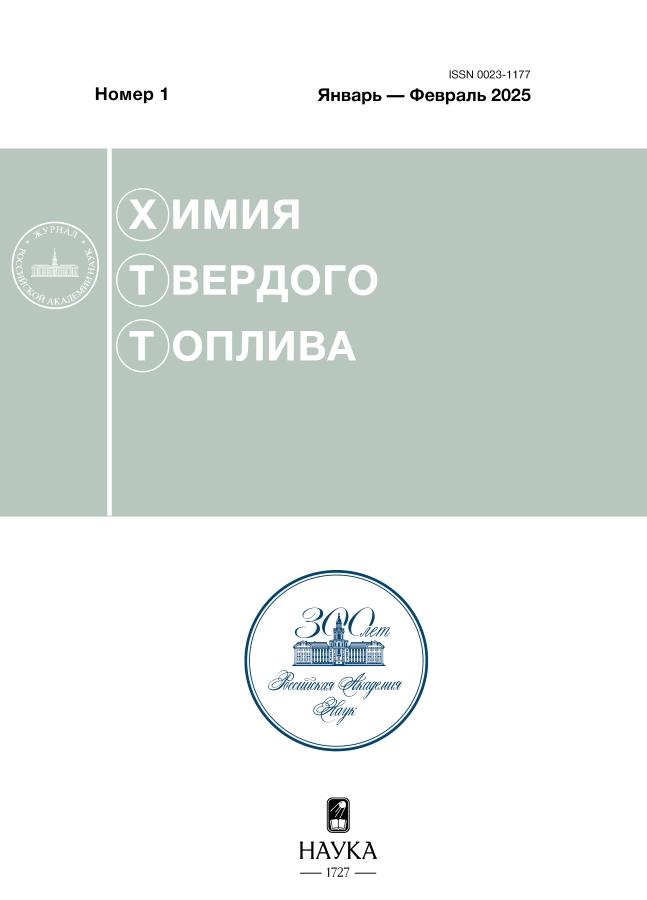Hydrocarbons composition of thermal and catalytic cracking products of asphaltens, derived in supercritical water medium
- 作者: Nal’gieva K.V.1, Pevneva G.S.1, Voronetskaya N.G.1, Kopytov M.A.1
-
隶属关系:
- Institute of Petroleum Chemistry, Siberian Branch, Russian Academy of Sciences
- 期: 编号 1 (2025)
- 页面: 67-74
- 栏目: Articles
- URL: https://ruspoj.com/0023-1177/article/view/684055
- DOI: https://doi.org/10.31857/S0023117725010097
- EDN: https://elibrary.ru/KTREGC
- ID: 684055
如何引用文章
详细
The hydrocarbon composition of oils of asphaltene cracking products has been studied. The experiments were conducted in three different modes: without the use of additives (without water and catalysts – a “control experiment”), in a supercritical water environment without a catalyst and in a supercritical water environment with a catalyst based on iron oxides. Cracking was carried out in a reactor at a temperature of 450°C, the duration of the experiment was 60 minutes, the catalyst was obtained in situ from tris – acetylacetonate of iron(III). The individual hydrocarbon composition of the oils isolated from cracking products was determined using chromato-mass spectral analysis on the quadrupole system GCMS-QP5050A “Shimadzu”. The hydrocarbon composition of asphaltene cracking products obtained in supercritical water differs in qualitative and quantitative characteristics from products obtained without water. When cracking asphaltenes in the water environment, the composition changes significantly compared to the “control experiment”, an increase in the proportion of saturated hydrocarbons is noted. The cracking products obtained in water with the addition of a catalyst are also dominated by saturated hydrocarbons, while the content of phthalates, alkenes and sulfur-containing compounds significantly increases.
全文:
作者简介
Kh. Nal’gieva
Institute of Petroleum Chemistry, Siberian Branch, Russian Academy of Sciences
编辑信件的主要联系方式.
Email: nalgieva.1997@gmail.com
俄罗斯联邦, 634055 Tomsk
G. Pevneva
Institute of Petroleum Chemistry, Siberian Branch, Russian Academy of Sciences
Email: pevneva@ipc.tsc.ru
俄罗斯联邦, 634055 Tomsk
N. Voronetskaya
Institute of Petroleum Chemistry, Siberian Branch, Russian Academy of Sciences
Email: voronetskaya@ipc.tsc.ru
俄罗斯联邦, 634055 Tomsk
M. Kopytov
Institute of Petroleum Chemistry, Siberian Branch, Russian Academy of Sciences
Email: kma@ipc.tsc.ru
俄罗斯联邦, 634055 Tomsk
参考
- Кривцов Е.Б., Гончаров А.В., Свириденко Ю.А., Мержигот М.И. // Известия высших учебных заведений. Серия: Химия и химическая технология. 2023. V. 66. № 11. P. 32. https://doi.org/10.6060/ivkkt.20236611.15t
- Goncharov A.V., Krivtsov E.B., Sviridenko N.N., Golovko A.K. // IOP Conference Series: Materials Science and Engineering. 2019. V. 597. P. 012022. https://doi.org/10.1088/1757-899X/597/1/012022
- Wang, T., Xu J., Liu X., He M. // J. of CO2 Utilization. 2022. V. 66. P. 102248. https://doi.org/10.1016/j.jcou.2022.102248
- Sharan P., Thengane S.K., Yoon T.J., Lewis J.C., Singh R., Currier R.P., Findikoglu A.T. // Desalination. 2022. V. 532. P. 115716. https://doi.org/10.1016/j.desal.2022.115716
- Song Z., Xiu F.R., Qi Y. // J. of Hazardous Materials. 2022. V. 423. P. 127018. https://doi.org/10.1016/j.jhazmat.2021.127018
- Isa K.M., Snape C.E., Uguna C., Meredith W., Deng H. // J. of Analytical and Applied Pyrolysis. 2016. V. 119. P. 180. https://doi.org/10.1016/j.jaap.2016.03.004
- Yu J., Jiang C., Guan Q., Gu J., Ning P., Miao R., Zhang J. // Fuel. 2018. V. 217. P. 275. https://doi.org/10.1016/j.fuel.2017.12.113
- Yesodharan S. // Current Science. 2002. V. 82. P. 1112. http://www.jstor.org/stable/24106796
- Bermejo M.D., Cocero M.J. // American Institute Chemical Engineering J. 2006. V. 52. P. 3933. https://doi.org/10.1002/aic.10993
- Kruse A., Dinjus E. // J. Supercritical Fluids. 2007. V. 41. P. 361. https://doi.org/10.1016/j.supflu.2006.12.006
- Каюмов Р.А., Сагдеев А.А., Галимова А.Т., Гумеров Ф.М., Усманов Р.А. // Вестник Казанского технологического университета. 2012. V. 15. № 1. P. 43.
- Свириденко Н.Н. // Нефтехимия. 2023. V. 63. № 3. P. 391-400. https://doi.org/10.31857/S0028242123030097
- Копытов М.А., Головко А.К. // Нефтехимия. 2017. V. 57. №. 1. P. 41. https://doi.org/10.7868/S0028242116060137
- Нальгиева Х.В., Копытов М.А. // ХТТ. 2024. № 2. P. 23. https://doi.org/10.31857/S0023117724020059 [Solid Fuel Chemistry, 2024, vol. 58, no. 2. p. 103. https://doi.org/10.3103/S0361521924020083]
- Hosseinpour M., Fatemi S., Ahmadi S.J. // Fuel. 2015. V. 159. P. 538. https://doi.org/10.1016/j.fuel.2015.06.086
- Туманян Б.П., Петрухина Н.Н., Каюкова Г.П., Нургалиев Д.К., Фосс Л.Е., Романов Г.В. // Успехи химии. 2015. V. 84. №. 11. P. 1145. EDN: VBEXXR
- Golovko A.K., Pevneva G.S., Kontorovich A.E. // Geochemistry International. 2000. V. 38. No. 3. P. 246. EDN: LFZJRR.
- Антипенко В.Р. Термические превращения высокосернистого природного асфальтита: геохимические и технологические аспекты. Новосибирск: Недра, 2013. 181 c.
- Головко А.К., Конторович А.Э., Певнева Г.С., Фурсенко Е.А. // Геология и геофизика. 2014. V. 55. №. 5-6. P. 931. EDN: SMXAXD
补充文件











